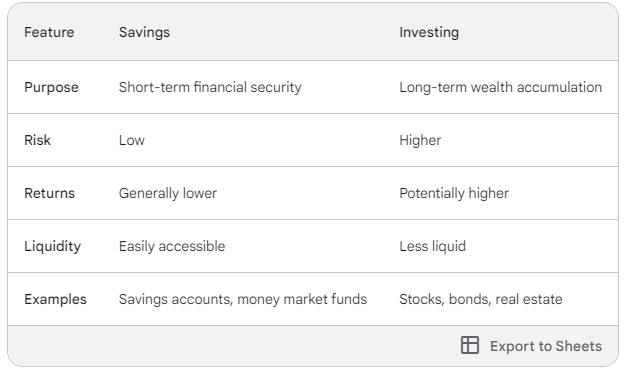
Savings vs. Investing: Making Your Money Work for You
Gull Rehman
11/18/20236 min read
Let's face it, everyone wants their money to work harder, not just sit around like a lazy bum. But figuring out the best way to do that can feel like trying to decipher ancient hieroglyphics.
Should you be saving or investing?
What's the difference anyway? Don't worry, friend, we're here to break it down for you in plain English.
Saving vs. Investing: What's the Difference?
Think of saving like stashing your cash in a safe place, like a piggy bank or, well, a savings account. It's about building a nest egg for those "just in case" moments – unexpected expenses, emergencies, or short-term goals.
Your money is safe and sound, but it's kind of like a couch potato, not doing much except chilling out.
Investing, on the other hand, is like putting your money to work, giving it a chance to hit the gym and bulk up. You're buying assets like stocks, bonds, or real estate with the hope that their value will increase over time.
It's about building wealth for the long-term, potentially earning a higher return than a savings account but also taking on more risk.


So, Which One is Right for You?
The answer depends on your financial goals and your risk tolerance. Here's a quick cheat sheet:
Savings: Your Financial Safety Net
Ideal for short-term goals (e.g., emergency fund, upcoming vacation)
Little to no risk of losing money
Access to your money whenever you need it
Lower potential returns
Investing: Growing Your Wealth for the Future
Ideal for long-term goals (e.g., retirement, buying a house)
Higher potential returns, but also a higher risk of losing money
Less liquid, meaning it can take time to access your money.
Saving Money for Beginners:
Let's start with the basics. If you're new to managing your finances, building a solid savings foundation is crucial. Here are some tips to get you started:
1. Track Your Spending: Awareness is key! Use a budgeting app or good old-fashioned pen and paper to track where your money goes. It'll make you realize those daily lattes add up!
2. Set Saving Goals: Give yourself something to strive for, whether it's a short-term goal like a new smartphone or a long-term goal like a down payment on a house.
3. Automate Savings: Avoid the temptation to spend by automatically transferring a fixed amount from your checking account to your savings account every month.
4. Look for Deals and Discounts: You'd be surprised how much you can save by hunting for bargains, using coupons, and taking advantage of seasonal sales.


Saving Money Hacks:
Want to pump up your savings game? Here are some creative hacks:
1. 30-Day No-Spend Challenge: Pick a category you tend to splurge on (e.g., takeout coffee, movie tickets) and commit to not spending anything on it for a month. You might discover you don't even miss it!
2. "Change Jar" Challenge: Every time you have spare change, toss it in a jar. It's a painless way to accumulate a surprising amount of money over time.
3. "Pay Yourself First" Method: Before paying bills, set aside a percentage of your income as savings. Treat it like a non-negotiable expense.
Investing for Beginners:
Now, let's dive into the exciting world of investing! Feeling a bit intimidated? Don't worry, we'll make it simple:
1. Start Small: You don't need a fortune to begin investing. Many online platforms let you start with as little as $5.
2. Diversify Your Portfolio: Don't put all your eggs in one basket! Spread your bets across different types of assets to manage risk.
3. Do Your Research: Before you invest in anything, understand what it is and how it works. There are plenty of free resources available online.
4. Invest for the Long Term: Remember, investing is about playing the long game. Don't get discouraged by temporary market fluctuations.
Remember, saving and investing are essential components of a healthy financial plan. By understanding the distinction between the two and implementing smart financial strategies, you can empower yourself to achieve your financial goals and secure a brighter future.


Investing for Retirement:
One of the most crucial reasons to invest is to secure your future self. Here are some tips to get you on track:
1. Open a Retirement Account: Look into options like IRAs or employer-sponsored 401(k) plans. These accounts offer tax benefits and allow you to grow your savings for retirement tax-deferred or tax-free.
2. Contribute Regularly: Even small contributions can make a big difference over time. Set up an automatic transfer to your retirement account so you don't miss a beat.
3. Adjust Your Contributions as Your Income Grows: As your salary increases, bump up your retirement contributions to take advantage of compounding.
4. Seek Professional Guidance: If you feel overwhelmed, consider consulting a financial advisor who can help you create a personalized retirement plan.
Both saving and investing have their merits, so let's explore the benefits of each and how they can contribute to your financial goals.
Certainly! Let's dive deeper into the topic of savings vs. investing and explore their pros and cons to help you make informed financial decisions.
Benefits of Saving:
Saving money is a fundamental financial habit that provides several advantages, especially in the short term:
1. Emergency Fund: Saving allows you to build an emergency fund, providing a safety net for unexpected expenses like medical bills or car repairs.
2. Flexibility: Having liquid cash readily available can give you the flexibility to seize opportunities or cover short-term financial needs without incurring debt.
3. Peace of Mind: Knowing you have savings can reduce stress and uncertainty, providing peace of mind during turbulent economic periods.
Considerations for Saving
While saving offers immediate benefits, it may not be enough to achieve long-term financial goals on its own:
1. Inflation: The purchasing power of cash diminishes over time due to inflation. Saving alone may not keep up with rising costs.
2. Limited Growth Potential: Savings accounts typically offer low interest rates, which means your money may not grow significantly over the long term.
3. Opportunity Cost: By keeping your funds in low-risk accounts, you forgo the potential higher returns that investing can offer.


Benefits of Investing:
Investing offers the potential for long-term wealth growth and can help you achieve your financial goals:
1. Higher Potential Returns: Investment vehicles like stocks and mutual funds have historically provided higher returns than traditional savings accounts over the long term.
2. Beating Inflation: Investments have the potential to outpace inflation, allowing your wealth to grow and retain its purchasing power.
3. Compound Interest: By reinvesting earnings, you can benefit from the power of compounding, where your money generates returns on top of existing returns.
Considerations for Investing
While investing can provide substantial benefits, it is not without risks and considerations:
1. Market Volatility: Investment values can fluctuate in response to market conditions, meaning that you may experience losses during certain periods.
2. Time Horizon: Investing is generally more suitable for long-term financial goals due to the potential for short-term volatility.
3. Risk Tolerance: Your tolerance for risk plays a crucial role in deciding your investment strategy. It's important to assess and understand your risk preferences before investing
Personal Finance Tips:
Managing your finances doesn't have to be a chore. Here are some general tips to keep your money in check:
1. Create a Budget: A budget is your financial roadmap, helping you allocate your income effectively.
2. Pay Off Debt: High-interest debt, like credit card debt, can eat away at your savings. Prioritize paying it off to free up more money for savings and investing.
3. Protect Yourself with Insurance: Insurance is your safety net, protecting you from unexpected financial losses. Get adequate health, life, and property insurance.
4. Review Your Financial Goals Regularly: As your life circumstances change, revisit your financial goals and adjust your plans accordingly.
5. Educate Yourself: Stay informed about personal finance topics. Read books, listen to podcasts, and attend workshops to expand your knowledge.


Striking a Balance
To make the most of your financial strategy, a balanced approach to savings and investing is often recommended. By maintaining an emergency fund and saving for short-term goals, you ensure financial stability and have readily available funds.
Concurrently, investing for long-term goals like retirement or wealth accumulation can help your money grow over time. Regularly reviewing and adjusting your financial plan is also essential to adapt to changing circumstances and financial goals.
Conclusion
Savings and investing are both critical components of a well-rounded financial plan. Saving provides immediate security and flexibility, while investing offers the potential for long-term growth. The right approach involves understanding your personal financial goals, risk tolerance, and time horizon. By striking a balance between saving and investing, you can make your money work for you and set yourself up for a brighter financial future. Remember, consult with a financial advisor to tailor your savings and investment strategies to your specific circumstances and goals.

